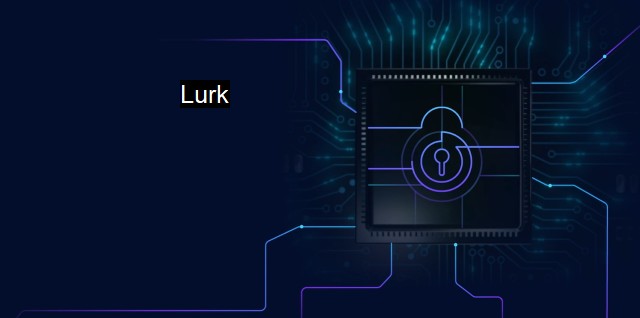What is Lurk?
Uncovering the Mysterious Practice of Lurking in Cybersecurity & Antivirus: How It Threatens Digital Society and How to Combat It
The term "lurk" carries its own distinct connotation. It refers to malicious activities that take place secretly within a computer system, often with the user being completely unaware of any unusual happenings. To lurk is to stay hidden, quietly observe, and wait with patience, seeking an opportune moment to launch an attack. This mode of operation is frequently used by cyber criminals and is national security's invisible enemy.One common type of lurking software includes Trojans, which may appear as standard applications on the surface but serve as gateways for cybercriminals. Named after the trojan horse from Greek mythology, these are programs you willingly download but contain harmful material which starts lurking once it is installed. Hercules defeated the mythical Trojan horse; similarly, antivirus systems play a critical role in rooting out and neutralizing these invaders.
Other lurking threats include worms, viruses, and spyware that inhabit the hidden corners of a computer system. Unlike worms, which are self-replicating programs that quickly consume hard drive space, viruses attach themselves to clean files, spreading within a network and harming computers on contact. Meanwhile, spyware lurks in the background, invisibly collecting information from the infected system and delivering it to remote servers from where attackers can easily access it.
Lurking can have severe consequences for both individuals and organizations. For individuals, it can lead to identity theft, exposure of sensitive data, and loss of personal files. For businesses, it can result in hefty financial losses, damaged reputations, and a breach of trust among clients and partners.
As alarming as the phenomenon of lurking may appear, several measures have been developed to curb the risks associated with it. Firstly, proactive cybersecurity practices such as updating and patching the software routinely, maintaining stringent security settings, using secure and varying passwords, and regularly backing up data can significantly reduce the risk of lurking threats. For instance, outdated software often harbors vulnerabilities that cybercriminals exploit to lurk and launch attacks. Ensuring the software is patched with the latest updates acts as a proactive defense measure, effectively mitigating the lurking risk.
Likewise, antivirus programs are shield-bearers in the battle against lurking threats. These specialized software tools scan and inspect the digital environment in which they operate, swiftly and systematically identifying any suspicious or unusual behavior. They are equipped with virus signatures, which regularly update to incorporate the modus operandi of newly discovered lurking threats. These programs are adept at detecting lurking malware and remove them from the system, keeping it clean and safe.
Also, educating oneself regarding various cyber threats and remaining cautious while engaging online can reduce the likelihood of falling victim to lurking schemes. With tricks like phishing and spoofing proving effective, it becomes imperative for users to scrutinize every piece of information they encounter on the internet.
While it's nearly impossible to completely rule out the presence of lurking threats, stamping out these attacks isn't impossible. A collaborative and comprehensive approach can neutralize lurking attacks, ushering in an era of safe and secure digital spaces. No matter how sophisticated these lurking threats become, humans armed with knowledge, protective tools, and vigilance can collectively outsmart and overpower them. In the perpetual chess match of cybersecurity, it's crucial to stay several moves ahead—after all, against a lurking enemy, the best offense is a good defense.

Lurk FAQs
What does it mean to "lurk" in the context of cybersecurity?
Lurking in the context of cybersecurity refers to the act of someone monitoring online activity or communication without actively participating or revealing their presence.Is it common for cybercriminals to lurk in online communities?
Yes, cybercriminals often lurk in online communities to gather information about potential victims or to identify vulnerabilities they can exploit.How can antivirus software protect against lurkers?
Antivirus software can detect and block attempts by lurkers to access or monitor your device or network. It can also prevent malware from being installed by detecting and quarantining suspicious files.What can individuals do to protect themselves from lurking threats?
Individuals can protect themselves from lurking threats by being cautious about what they share online and who they communicate with. Using strong passwords, keeping software up-to-date, and using antivirus software can also help to reduce the risks of being targeted by lurkers.| | A | | | B | | | C | | | D | | | E | | | F | | | G | | | H | | | I | | | J | | | K | | | L | | | M | |
| | N | | | O | | | P | | | Q | | | R | | | S | | | T | | | U | | | V | | | W | | | X | | | Y | | | Z | |
| | 1 | | | 2 | | | 3 | | | 4 | | | 7 | | | 8 | | |||||||